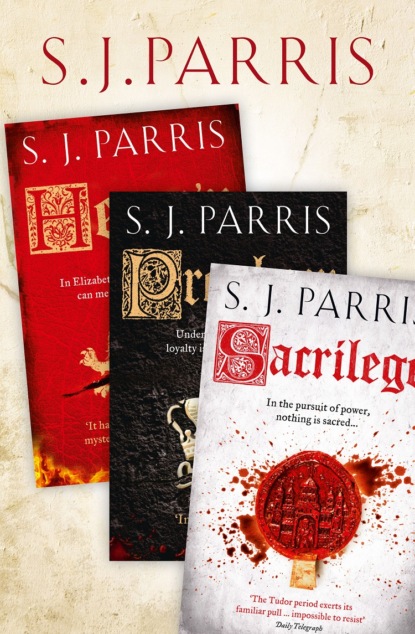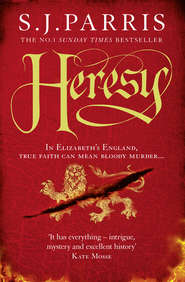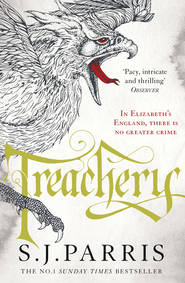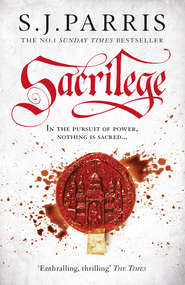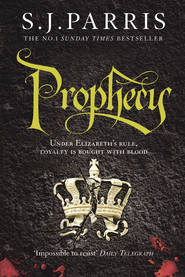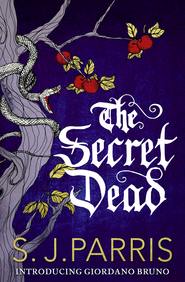По всем вопросам обращайтесь на: info@litportal.ru
(©) 2003-2024.
✖
Giordano Bruno Thriller Series Books 1-3: Heresy, Prophecy, Sacrilege
Автор
Год написания книги
2019
Настройки чтения
Размер шрифта
Высота строк
Поля
‘Rector Underhill –’ I barely knew where to begin – ‘I must seek your advice on another matter altogether – the death of Roger Mercer.’
Immediately the colour drained from his face and his eyes became watchful. He wiped his brow with his sleeve.
‘Yes. The talk at Christ Church was of little else, but I am confident that we have put all malicious rumour to rest.’ He grew thoughtful. ‘Perhaps tomorrow the morning service in chapel should be a service of remembrance, especially since the funeral will have to wait until after the inquest – which I learned at dinner cannot be for a few days, as the coroner is away. You will be able to stay in Oxford to testify, Doctor Bruno, I presume?’
I did not answer. Instead I passed him the slip of paper with the quotation that had been cut from a book.
‘Do you recognise this?’
He peered closely at the small type, then slowly raised his head to fix me with an expression of uncomprehending fear.
‘The wheat of Christ,’ he said softly. ‘Ignatius. What is this?’
‘It is from Foxe, then?’
He nodded slowly.
‘The martyrdom of St Ignatius – or, rather, Bishop Ignatius of Antioch, we should call him, martyred under the Emperor Trajan. Foxe quotes these as his last words as he is thrown to the wild beasts.’ He handed the paper back to me with an expression that might almost have been anger, although his hand was trembling.
‘This paper was pushed under my door while I was at the disputation. It seems that someone wanted to draw my attention to the manner of Doctor Mercer’s death.’
‘By cutting up a book? Who would do such a thing? I’m afraid I don’t follow your reasoning at all, Doctor Bruno.’
‘Not for the first time today,’ I muttered, but forced myself to be polite. ‘You and I both saw this morning that Roger Mercer had been locked into that garden with a savage dog. I have wondered, Rector Underhill, if his death was intended by someone who lured him there on the pretext of a meeting, and then set the beast on him in some kind of perverse parody of martyrdom. And it seems this message has been sent to me as a clear indication that someone here knows why he was killed, perhaps by whom.’
Underhill gestured frantically for me to lower my voice, glancing fearfully at the study door. He was undoubtedly shocked, but after a moment he composed his features and produced a choked, nervous little laugh.
‘Dear God, what a fevered imagination you Italians do have, Bruno!’ He shook his head dismissively. ‘I fear that in the confusion and horror of this morning’s tragedy we allowed ourselves to rush to somewhat hysterical conclusions. We must not permit our natural shock and grief to spin improbable fancies out of a terrible accident. As for this paper, it rather looks as if someone is toying with you, feeding these wild fancies of yours with the intention of making a fool of you. Better not to give them the satisfaction of rising to the bait.’
I turned to leave, furiously trying to quell my boiling blood. When I spoke, it was with all the self-control I could muster, my nails biting into the palms of my hands with the effort.
‘I was an eye-witness, Rector Underhill. I was examining Roger Mercer’s body and the scene of his violent death while you were vomiting over your shoes like a woman. My testimony will be of more value to any inquest than yours.’
At this he bristled and his tone was of open hostility.
‘Oh, you imagine so? The word of a foreigner? A Catholic? A man reported to practise magic, who openly believes the Earth goes around the Sun?’
I took a deep breath and waited until the urge to hit him had passed, before opening the study door back to the dining room.
‘Thank you for your time, Rector. I will not impose upon you any longer.’
‘One thing more, Bruno. I don’t know what customs you keep in Italy, but in England it is not considered proper for an unmarried woman of good reputation to converse alone with a man, even a gentleman. Therefore I forbid you any further private conversation with my daughter.’ He folded his arms pompously. I paused in the doorway.
‘With the greatest respect, Rector, do not presume to command me as if I were one of your undergraduates. But if you wish, you may send for a governess to teach me obedience. I might benefit from that,’ I added, with a wink, and closed the door behind me, my heart pounding hard with indignation. The servant, Adam, handed me my cloak and bade me good night with a condescending sneer; I snatched the garment up quickly without thanking him and hastened for the door, thinking that if I stayed another moment among those insufferable people there might well be another murder committed that day.
EIGHT (#ulink_4651ae3e-b4ca-51fa-a7e0-e5570328741f)
I woke before dawn and lay on the narrow wooden bed watching the patterns of pale light gradually spread across the ceiling from the chink in the window drapes. I had slept fitfully, knotted up with anger at the way I had been treated by Underhill and his colleagues. During the many hours of wakefulness I had determined that it was fruitless for me to stay in Oxford, regardless of the inquest or the royal visitation; I would seek out my horse from the rector’s stables at first light and find my way to London by any means possible. I was conscious that I had found out little of use to Walsingham yet, and he would surely not appreciate the explanation that I had left in a fit of pique because I had been publicly humiliated, but I was so clearly unwelcome here that it seemed unlikely I could ever carry out his plan of gaining the Fellows’ confidence and thereby learning anything useful.
I sighed and turned on my side, wrapping myself tightly in the sheet against the draught, and allowed my thoughts to drift back to Sophia. I had lain awake the previous night, my thoughts full of her. She was a compelling enough reason to stay in Oxford and an equally compelling one to leave. I realised that it had been some time since I had been as close to a woman as I had come the evening before when she had almost fainted into my arms, and the jolt of longing that shook me at that moment had left me profoundly disconcerted. I wondered if she had felt it too; there were moments while we talked when her frank gaze had locked with mine and it seemed she wanted me to read something there, but I knew that as a guest of her father’s I must take great care how I approached her. Besides, I reminded myself, had she not spoken with a kind of pitying regret of the way her father had spent his life dependent on the patronage of great men, and was I not in the same position? I had no means to marry, no money or property of my own, nothing to offer a young gentlewoman except my affection, and I knew from experience that a father places little value on such things in his daughter’s suitors. So I could not court her respectably, and although that fleeting touch the night before had powerfully awoken my desire, I already knew that I liked her too much to think of a casual seduction. I wanted urgently to see her again, yet had no idea what I hoped might happen between us. My mind kept running back to the expression on her face when I showed her the Copernican diagram; the fleeting light of recognition in her eyes at the symbol of the wheel. What did Sophia know, and how could I persuade her to confide in me?
The chorus of birdsong became more insistent. I pulled back the sheet and crossed the room to draw the drapes and look out over the courtyard of Lincoln as the pink early light streaked across the sky in gaps between jagged clouds. The rain had given Oxford a temporary reprieve, though there was no guarantee the road to London would be passable after the weather of the past two days. The flagstones of the quadrangle gleamed under the night’s rain, puddles reflecting slashes of pale rosy sky. I could not make out the hands of the clock from my window, but thought I may as well dress anyway; as soon as the college was up and stirring I could ask Cobbett how I might go about recovering my horse. I wondered if I should say a formal goodbye to the rector, claiming I had pressing business to return to, but then I might learn that I had a legal obligation to stay and testify at the inquest; better to leave first and plead ignorance later, I thought, and I did not want to give Underhill the satisfaction of seeing that he had driven me away. Perhaps I could leave a message for Sidney on my way out of the city.
I was about to turn away from the window when a sudden movement in the courtyard caught my eye; a figure wearing a black cloak with the hood pulled up scurried from the south-west corner of the quadrangle and disappeared into the tower archway. Immediately I felt my muscles tense; I had not been able to make out who it was, but if I was quick to follow I might see who could be dashing about so furtively at such an hour. I grabbed for my shirt, and then paused, berating myself. Had I not already decided that whatever undercover comings and goings went on in this place were not my business? I would leave today, and if there was a murderer in the college they would just have to deal with it themselves; my attempts at finding the truth had been met with contempt and threats, and I wanted nothing more to do with any of it.
As I pulled on my shirt and breeches, a single bell began the doleful call to Matins and I recalled with a sinking heart that it was Sunday. The servants would probably have a day off; I would be unlikely to find anyone able to help me locate the horse and, in any case, I would have to return it to the stables at Windsor and how I might make my way back from there to London alone on a Sunday, I had no idea. In the unsparing daylight, my planned flight began to look as ill judged as it was cowardly.
I poured some water from the pitcher left on the small table and washed my face slowly; if I had to stay for one more day, I could at least try to put it to some profitable use and I would start by attending chapel. I had no wish to hear the English service for its own sake – while I found no spiritual nourishment in the Roman Mass, at least it put some effort into its theatrics, and I found the English prayer book as bland as uncooked dough beside it – but it would be a useful opportunity to observe the whole college community gathered in one place. If one of them had sent me the strange message last night, as seemed likely, it was possible that he might give himself away by looks or gestures. I thought of him now, as I splashed my face, with irritation; if he had any useful information to impart, why not make himself clearer?
James Coverdale had mentioned at the first night’s dinner that the rector was preaching a series of sermons based on Foxe’s book; if Roger Mercer’s killing was some twisted parody of martyrdom, as someone clearly wanted me to believe, it was possible that the killer had taken inspiration from the rector’s sermons. It was even possible that he would be among the congregation that morning. I shivered, pulled on my boots and, as the bell continued its solemn clang, I hurried to join the black-gowned figures heading for the central archway of the north range, under the clock, which showed the hour to be almost six.
The chapel occupied the larger portion of the first floor of the north range, to the right of the archway, and I filed dutifully up the dim stairs among the students and Fellows, the only light offered by a candle lantern suspended from the landing above. By the door I noticed a holy water stoup, long dry, as we passed into a modest, lime-washed room with a wooden-beamed roof, the floor strewn with rushes. A small altar stood at the furthest end, opposite the door, with a lectern to the right of it; candles burned on each side of the chapel and on the altar, and the men arranged themselves along the rows of hard oak benches apparently designed for maximum discomfort, to prevent anyone from drowsing during sermons. Narrow arched windows of plain glass on both sides of the small chapel filled it with early morning light that gleamed from the white walls and on the long dark hair of Sophia Underhill, who was seated on the front pew by the lectern, where she would be under her father’s watchful eye. I wondered that he allowed her to attend chapel with the scholars; her presence seemed guaranteed to distract young men from pious prayer. Then I noticed that her mother was seated beside her, her thin shoulders hunched beneath the white coif which bound her hair. Around her the senior Fellows were ranked along the front benches, with the older students – those proceeding to masters or doctors degrees – seated in the rows behind them, and the undergraduates at the back. As I hovered by the door, wondering where I should properly take my place, I had a chance to see just how small the college community was. There could not have been more than thirty men, including the senior Fellows; with lives spent in such close proximity, surely one among them had some knowledge of what had really taken place in the Grove the previous morning. Taking in the room in a swift glance, I spotted Thomas Allen and Lawrence Weston among the under graduates, though there was no sign of Norris or the loud commoner friends he had brought to the tavern; I presumed that Matins was yet another college rule they were able to buy their way out of. William Bernard and Richard Godwyn, the librarian, sat on the front bench, and I noticed John Florio in the middle, whispering animatedly to his neighbour. These were the only men I had met personally in the college, yet there was every possibility that my mysterious correspondent was someone who had yet to introduce himself.
But he must have been a member of the college, to have known where to find my chamber. I turned to glance again at the young men seated behind me and those in my line of sight returned my stare with mild curiosity; these English boys all looked the same – pale, underfed and anxious. One among them knew something he wanted to impart to me and was afraid to say outright – but which one?
I had intended to find a seat that would give me a vantage point over all those gathered, but Godwyn, seeing me hesitating at the door, smiled and gestured to a place next to him on the front bench. I could hardly refuse; conscious of all the eyes on me, including Sophia’s, I walked down the short central aisle and sat down beside Godwyn, who welcomed me in a whisper as we bent our heads to pray. I could not help noticing that both Walter Slythurst and James Coverdale were absent. When the men were all seated, they rose again as one, as the rector processed the short distance from the door to the altar followed by four young men in the white surplices of choirboys.
Looking up, I caught the rector’s eye; if he was surprised to see me among his congregants or repented of his hard words the night before, his face gave no sign of it. Instead he merely bowed his head and intoned the Our Father.
‘O Lord, open Thou my lips,’ he began, and the congregation dutifully responded,
‘And my mouth shall show forth thy praise.’
I was not familiar enough with the order of the responses to follow them fluently, and kept my voice to a whisper to avoid drawing unwelcome attention to my mistakes. Godwyn rose to read the first lesson from the Gospel of Matthew, and after he was seated again, the small choir sang a four-voice version of the Te Deum Laudamus in English, which was remarkably sweet for all its plainness.
‘Yesterday, gentlemen,’ the rector went on, staring resolutely over the heads of his congregation, apparently excluding his wife and daughter from his address, ‘sudden violent death intruded most horribly into our little community. I know that the tragic attack on our dear friend Roger Mercer as he walked at prayer in the Grove has shaken all of us to the core, and I know too that when such a dreadful accident occurs, we can all too easily allow our brains to grow heated with the shock and indulge in all manner of wild speculation.’ Here he flashed a pointed glance at me, so quickly as to go almost unnoticed. Doctor Bernard cracked his bony knuckles together; the snap was startling in the still room.
‘It would be more profitable,’ the rector continued over-loudly, as if he were speaking to a much larger gathering, ‘if, instead of unhelpful rumour, we allowed some good to come from this tragedy by concentrating our minds on the brevity of our lives in contrast to the vastness of eternity, and looked to our own standing before God. Let us mourn Roger, as is right and proper, but let us also learn from his death and ask ourselves, would we face death assured of our own salvation, if it should come upon us as suddenly?’
‘It almost sounds as if he expects another tragedy,’ I whispered to Godwyn; Underhill glanced up and frowned angrily from behind his lectern, though he could not have heard my words.
‘Let us return, then, as we have in recent weeks, to Master Foxe’s account of the persecutions of the early believers, our forefathers in faith in the days when the Church was pure. Not so that we may pay them idolatrous reverence as saints, as the Roman Church does, for they were only men and women like us, but so that we might emulate their faith and better understand the long and venerable history of suffering for Christ and of standing firm, as those martyrs of Reform have done in this troubled century of ours. Let us ask ourselves, as we consider today the story of Alban, the first English martyr, if we truly believe that the preservation of the faith is the highest good. For these are turbulent days, my friends,’ he continued, his voice rising slightly as he leaned over the lectern to fix his listeners with a stern eye. ‘Our English Church is besieged on all sides by those who would drag us back to Rome. You young men sitting before me today are the future leaders of Church and State, and you do not know how you may be called upon to fight for both in the years to come. Will you be resolute, even in the face of death? Will you defend our liberties from the idolaters and tyrants who would tear them from us? I pray it may be so.’
From the benches behind me, a collective movement could be heard; the sound of several rows of young men drawing themselves up proudly in response to this rallying cry. I found something disturbing in Underhill’s tone; there was a barely suppressed fanaticism to it, but his words reminded me of Walsingham’s.
The rector’s homily was more of a lecture than a sermon, though it was a relief to find that his talent for expounding on a text was greater than his talent for debating ideas. But as he spoke, I became so lost in my own speculation that I barely noticed when he pronounced the final collect, and was only dislodged from my reverie by Godwyn nudging me apologetically as the men around me all stood. The rector and his choir filed out and the congregation shuffled and stretched as they made ready to leave. One young man with violently red hair and a face peppered with freckles, who looked barely old enough to be away from his mother, busied himself at the front of the chapel, tidying away the accoutrements of the service, closing the large bible on the lectern and snuffing out the candles around us. As she drew towards me, Sophia smiled and seemed about to speak, but her mother, noticing the look that passed between us, pinned her daughter firmly by the elbow and led her towards the door. Sophia glanced once over her shoulder and there seemed to be something imploring in her expression, but I might have imagined that.
‘I am sorry to have poked you so unceremoniously, Doctor Bruno,’ Godwyn whispered, as the red-haired young man clearing the chapel approached us and handed Godwyn the last remaining flickering candle, ‘but I feared you were having some trouble following our Book of Common Prayer – the manner of our service must seem very strange to you.’
‘Not so strange,’ I replied, watching as Sophia passed out of sight before turning back to him with a smile, ‘you have borrowed a great deal of it from us, after all.’
He gave a small, polite laugh.
‘But tell me, did you not think our little choir sings well?’ he asked brightly as we walked towards the door, making a shield of his hand to protect the candle as the draught from the stairs assaulted it.
‘I have heard choirs twice their number make a poorer job of the psalms,’ I said truthfully.
‘The arrangement is by Master Byrd, Her Majesty’s own composer,’ he said, looking pleased at the praise.





